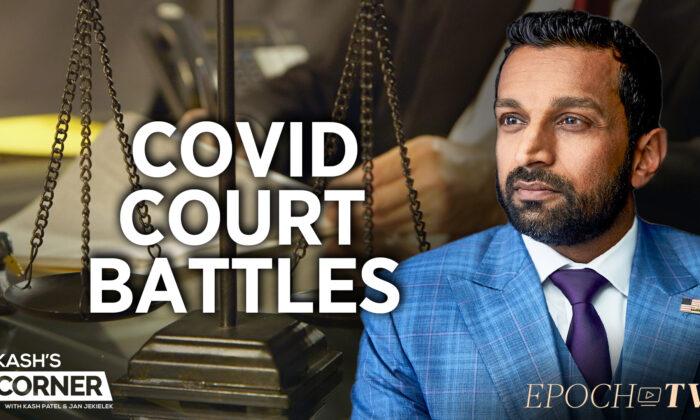When asked about people getting fired for not complying with vaccine mandates and whether or not these are reasonable expectations under the law, Kash explains that the law applies differently to the public sector versus private industry. The United States Military has terminated over 100 soldiers. Cases regarding the military mandate have had to wait until recently to be brought to court; first, because the mandate had to pass, then it had to take effect by actually discharging people from the military. Since it has now taken effect, military personnel have the right to bring a cause of action to court because they have standing if they were terminated. Now the courts have to adjudicate whether or not the government has sufficient authority during a time of a supposed emergency, to enforce this mandate.
Kash says he does not think the government has this right, partly because not providing people with the information and proof as to why they are being fired will not bode well in court. He explains that not providing detailed rationale as to why a policy is reasonable actually provides a defense for the person bringing the suit. The courts will examine the issue this way: if the government wants to do something, it has to show why. In court, the plaintiffs will say that the government told them they had to take the vaccine or else they would get fired, and the courts will say, why? The plaintiff will say they didn’t tell them why, they were simply told that they didn’t take it, so they are fired. “That’s insufficient in court,” says Kash.
Another avenue plaintiffs could use to argue their cases is that the rationale, if provided, is insufficient. The court’s standard is very high and the defendant must show that there is an overbearing emergency that justifies interfering in an individual’s right to health. This means that the plaintiffs can say that even though they were provided a rationale, the reasons given are poor and don’t serve the interests of the law or the public, and then the judge could adjudicate that matter.
Recently, the Supreme Court declined to issue an injunction against New York City vaccine mandates for healthcare workers, essentially not allowing them to seek religious exemptions for the vaccine. Kash says it’s important to understand that the Supreme Court is the last and final court. Because of this, they want cases to be adjudicated by all the lower courts in proper order before coming before the Supreme Court. First cases must be heard at the lower level federal district courts, or if it is a state issue it must be heard at all the levels of state court. “I think the Supreme Court was probably exercising some jurisprudence by saying they shouldn’t be the ones to jump in right away,” says Kash, also explaining that the Supreme Court realizes the mandates won’t just be a New York City issue, but rather a nationwide issue that must be dealt with in every different state. He also notes that different states have different laws, which can complicate and drag out the court process.
In regards to the Pennsylvania COVID-19 patient, a married man and father, who died while trying to get Ivermectin that had been prescribed to him by a telehealth doctor, Kash says it is a tragedy. The hospital wouldn’t give the drug to the patient because it wasn’t in line with their protocols, until eventually a judge ruled that the hospital had to give it to him. The process took nine days and the patient died. The patient wanted the right to try to save his own life. “We went through this with the monoclonal antibodies. When those were first issued, half the country said ‘that’s crazy science, that stuff doesn’t work’ and if you fast forward now, six, eight, ten months down the road, there’s a line for monoclonal antibodies for people who have come down with COVID because it worked so much,” says Kash. “Ivermectin could be another six to eight months down the road in terms of that efficacy, we just don’t know, and seizing that right from a person, I think, is extremely bad judgement from the hospitals.”
He also notes that the same issue applies to doctors who are being fired for trying to treat patients with Ivermectin. The hospitals are seizing the rights of a doctor who is board certified, went to medical school, and is on the front lines treating COVID. Kash believes that doctors and patients should have the right to agree on a treatment plan together. “If they both agree that this might work or could work, they should have the choice as a hospital and a doctor to administer it and as a patient to receive it. And I think this is also going to be something you will probably see land in the courts. There’s going to be extensive COVID litigation for years to come.”
Traditionally, there is a doctor patient relationship where a doctor tries to provide the best treatment and fully inform the patient of the potential outcome. However, the COVID-19 pandemic has shed light on the realities of how the hospital system functions. There are factors at play with diagnosis and treatment decisions at a higher level that decide what doctors really can or cannot do to treat their patients. If organizations can decide what a patient and doctor can and cannot agree to, they are removing the option to treat the patient based on the facts and circumstances of that particular situation. To make matters worse, Kash thinks this decision is being taken away based on political reasons, not on facts. “It’s scary and I think it’s unfortunately going to get worse, unless we keep talking about it.”
Playing politics instead of operating on facts is what happens when people in power don’t wait for the evidence to come out. Florida and New York have taken almost opposite policies regarding COVID restrictions, and now Florida is seeing one of the lowest case rates in the country while New York is still seeing a high surge. Kash notes that unless we are given time to put out the information correctly, we cannot evaluate what the best response is.
Watch the full episode of “Kash’s Corner” for more details, including the legal ramifications for schools vaccinating minors without parental consent, the scientific data showing the low COVID risk for children, and how these cases from concerned parents will stand in court.
Help us spread this information by sharing this article!





